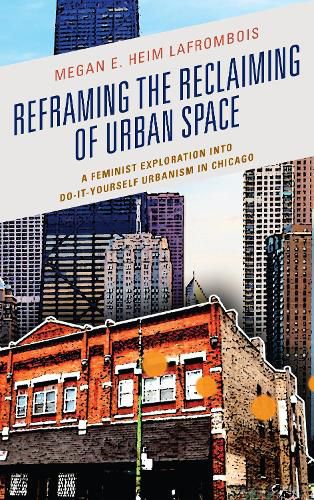Readings Newsletter
Become a Readings Member to make your shopping experience even easier.
Sign in or sign up for free!
You’re not far away from qualifying for FREE standard shipping within Australia
You’ve qualified for FREE standard shipping within Australia
The cart is loading…






In Reframing the Reclaiming of Urban Space: A Feminist Exploration into Do-It-Yourself Urbanism in Chicago, Megan E. Heim LaFrombois explores the concept of do-it-yourself (DIY) urbanism from an intersectional, feminist, analytical framework. Interventions based on DIY urbanism are small-scale and place-specific and focus on urban spaces which can be reclaimed and repurposed, often outside of formal urban planning institutions. Heim LaFrombois examines the discourses and processes surrounding the institutionalized and embedded nature of DIY urbanism. She weaves together sites and sources to reveal the ways in which DIY urbanists make sense of their participation and experiences with DIY urbanism and with the broader political, social, and economic contexts and spaces in which these activities take place. Her research findings contribute to and build on current research that illustrates the importance of gender, race, class, and sexuality to cities, local politics, urban planning initiatives, and the development of communities.
$9.00 standard shipping within Australia
FREE standard shipping within Australia for orders over $100.00
Express & International shipping calculated at checkout
In Reframing the Reclaiming of Urban Space: A Feminist Exploration into Do-It-Yourself Urbanism in Chicago, Megan E. Heim LaFrombois explores the concept of do-it-yourself (DIY) urbanism from an intersectional, feminist, analytical framework. Interventions based on DIY urbanism are small-scale and place-specific and focus on urban spaces which can be reclaimed and repurposed, often outside of formal urban planning institutions. Heim LaFrombois examines the discourses and processes surrounding the institutionalized and embedded nature of DIY urbanism. She weaves together sites and sources to reveal the ways in which DIY urbanists make sense of their participation and experiences with DIY urbanism and with the broader political, social, and economic contexts and spaces in which these activities take place. Her research findings contribute to and build on current research that illustrates the importance of gender, race, class, and sexuality to cities, local politics, urban planning initiatives, and the development of communities.